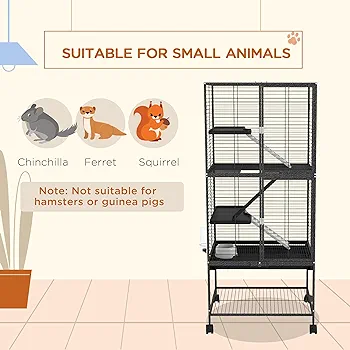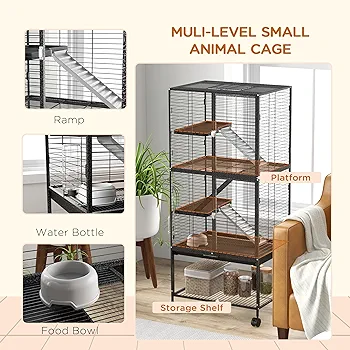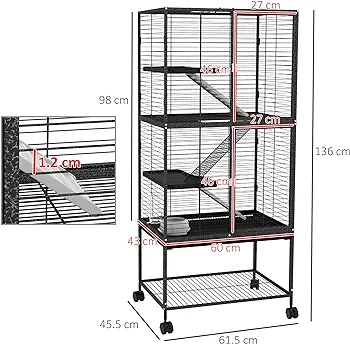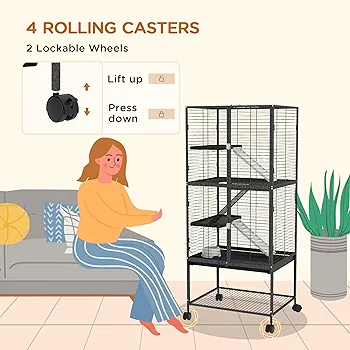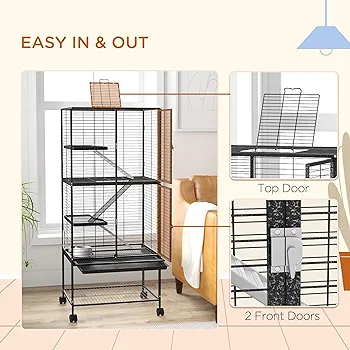Where to get one really depends on where you live, but go with a breeder not a big box pet store like petsmart, petco, petland, etc. The ones in pet stores are often from breeding mills and they don't tend to know how to properly care for them in store so genetic issues from poor breeding are more common as well as getting a sick or one that has ingested something they shouldn't at the store are much higher.
The best cage is the Ferret Nation cage, but the Critter Nation is a good cage too, a single unit one is big enough for one chin, but bigger is almost always better so if you can afford the double unit I would go with that. The difference is the bars, the FN has mostly vertical bars that are 1" apart, that is the max spacing that can contain an adult chinchilla. The CN has mostly horizontal bar that are 1/2" apart, which is good for younger chinchillas, like those under 4-6 months since they are often still small enough to squeeze out of 1" bars. Also the CN is better if you have young kids or other animals in the house that might stick things in the cage or try to paw at the chinchilla through the bars. The FN is sturdier though, so if you prefer that one you can also cover it in hardware cloth until the kit is bigger.
The absolute essentials would be, a ceramic or metal food bowl, hay holder, glass water bottle, a hideout house, dust bath and dust, wood toys to chew on, a good quality pellet only food, hay, and bedding (either fleece cage liners or aspen shavings). If you have questions about brands or if something is chin safe, just ask, but to start you off, for food the Oxbow Chinchilla Essentials food (NOT the other formulas) is one of the best foods and easily found in stores. I know there is a lot of misinformation online, but chins should not have any fruits, vegetables, seeds, nuts, animals products (milk, eggs, meat, bone, hide, etc), or sugars. Good treats for them are things like certain dried flowers, leaves, herbs.

Another essential is an AC unit, unless where you live never ever gets above about 70F/20C even on the hottest day of the year, and low humidity, then you need an AC to keep the room the cool and dry enough, or the chin could get sick and die. Ideal comfortable temp for chins is about 50-70F (10-20C) much below that and depending on age and health they can get chilly (though most can handle much colder), and much above that they can overheat and die.
Other things that are nice to have would be shelving, ledges, and perches to jump around on, fleece hammocks, a variety of hanging and toss toys (different types of wood, palm leaf, lave rock, bamboo, hay shapes, etc), tunnels (metal, wood, or ceramic), cooling stones (either the granite "Chin Chillers" or even granite tiles work) a chin safe wheel which unfortunately aren't sold in stores (needs to be at least 15" and solid metal).
This is an old photo of my cage (it's a double Ferret Nation but modified) during Christmas, but to give you some ideas
https://www.chins-n-hedgies.com/threads/christmas-cage-decor.35946/ Depending on your house if you can't chin proof a room for them you can use pet fencing or playpens to make a chin safe area for play, but keep in mind chins can jump 5-6 feet if they want to so things like fencing can often work better to fence off things rather then to contain the chin. Also chins can, and almost 100% of the time will, chew on anything and everything if given the chance so you need to make sure there is nothing they shouldn't chew on accessible (also keep that in mind if going with fleece liners and hammocks, although most chins don't chew on them some do, making them unsafe to use). Similar to a young toddler chins put everything in their mouths and chewing on things is not something that they can really be trained not to do, and since they need to chew to wear down their ever growing teeth discouraging chewing is not a good idea.
With proper care, and barring genetic issues, chins are generally pretty healthy. The most common issues, especially if you get the chin from a pet store, are giardia and ringworm. They can also get bumble foot, which is an infection of the feet if not kept in a clean cage or if kept on metal mesh or wire floor that aren't properly cleaned (mesh and wire floors and ladder/ramps also increase the risk of broken toes, feet, and legs). Aside from that, heart murmurs are not uncommon in chins, most are mild and the chins can live perfectly normal lives without any issue though, and poor breeding (as well as injury or poor care) can cause misaligned teeth, known as malocclusion or "malo" for short. They can also get diarrhea and bloat if fed inappropriate food or the food is changed or introduced too quickly. They are also prone to diabetes, tooth decay, and obesity if feed too much sugar in their diet, they didn't evolve to digest a lot of sugar and there is already sugars in their pellets, hay, and in the bark of wood they chew. Male chins can also get hair rings (shed fur tangled around their penis), most take care of it themselves but sometimes may need help removing it, more common in young or breeding males, or ones that are sick or injured.
As far as insurance there isn't much available for chinchillas, very few actually accept chinchillas and even those that do don't cover anything genetic like heart murmurs, and malo. Personally I just go with a savings account and have a credit card I can use in case of emergency. Chins don't need any regular vet care like a cat or dog, but it's a good idea to get them seen by a vet at least for a wellness exam when you get them so they are in the system as a patient. Yearly wellness exams are advised, especially for new owners since chins are good at hiding they have an issue, but depending on where you live and how stressed it makes your chin you may need to figure out what is best for you and your chin. Not all vets will even see chinchillas either, they are considered an exotic, so it's a good idea to find one before you need one, and ideally try to find a place that will see them in an emergency (after hours and/or on weekends, or if your normal vet is busy) too.
Settling in to a new house really comes down to the chinchilla and your household. It takes most chinchillas at least a week or two to get use to a new home, but up to a month is not uncommon depending one where you got them and their own personality. Just like humans some chins are more outgoing and social, others are more fearful, and everything in between. If possible try to let the chin come to you rather then grabbing it out of the cage, with chins you have to earn their trust, so if you grab them or chase them it's just proving to them that you are not to be trusted. For the first week or so just spend time sitting by the cage, talking, reading aloud, and singing can all help get the chin use to your voice. You can also give the chin something every time you come in the room, try to limit treats to no more then one a day, but you can give chew sticks, hand them pellets or bits of hay, small toss toys, etc, to get them a positive association with you coming into the room. One advantage of going with something like the double FN or CN vs a single is you can close off the middle floor so you can clean one unit while the chin is safely secure in the other if the chin isn't comfortable with handling yet or you don't have someone to watch the chin or somewhere to put them while you clean the cage. Personally I have a small cage I put my chin in while I clean his cage, it also has his dust bath in it so he can bathe while I clean is cage.





